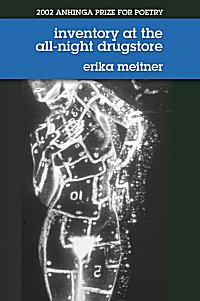
Inventory at the All-night Drugstore by Erika Meitner
Robert Dana-Anhinga Prize for Poetry (2002)
Erika Meitner's is a vertiginous art — full of flash and dazzle, fire and speed, the offbeat and the upbeat, the buoyant bob and weave. She's a poet of perpetual motion, cataloguing pockets of turbulence, gospels of lust, the hours before happy — and after. Erotic, comic, quirky with wordplay and double entendre, her poems embrace the everyday, teasing the miraculous from the mundane. By turns hilarious and heartbreaking, Meitner casts a wry, empathic eye on the sanctities and subterfuges that keep us human. She is a true original, her affectionate attention resonating in poems that "make the world sing on cue." -- Ronald Wallace
In Erika Meitner's Inventory at the All-Night Drugstore, we enter worlds marvelously realized, our intrepid narrator an unerring guide. Whether we navigate the initiatory mysteries and indignities of adolescent urgencies, the perils and pleasures of the adult sexual quest, or the vital chaos of teaching in a Brooklyn public school, we are in the care of a poet who cares: feisty, funny, and ever alert to the telling details of a life lived in the rush and anguish of the post-modern world. These are poems like the tattoos she hymns and ponders ("Etched meat, I keep thinking/ while Tom works this buzzing needle/ around my leg.") -- they mark our very being with their delicate, indelible patterns, their swoops and utterances and wild surmises. -- Gregory Orr
The reader takes an unpredictable, exhilarating trip with the subject matter of Erika Meitner's poems -- from memories of a hormone-charged adolescence in the big city, to adult affairs of love and lust and loss; from learning to teach in a classroom filled with pubescent fireplug mirrors of oneself, to confronting one's Jewish history at the hands of an equally fiery grandmother. But riding herd on all this range is Meitner's distinctively snappy voice, a blend of assertiveness and vulnerability which at one moment can insist, "Feed me / a sly salacious salad," then at the next can fear "that the female body // must be marked / before it can serve // as a vehicle / for the spirit." When she watches a blind man brashly driving a bumper car at a county fair, her poetry's raison d'etre comes at least momentarily clear:
I wished I could be that fearless—to be plunged
into darkness, strapped in and moving forward,
not knowing what might come barreling
from any direction to clock me into oblivion. -- Contest judge Stephen Corey
Cover art: "Rivetgirl" by Chris Schiavo
Labor Day
The way we sleep to-
gether is locational,
seasonal -- the way
you can buy useful things off
the roadside here in
summer passing through: peaches,
heirloom tomatoes,
squash, sweet corn, bait, antiques, rugs,
tie-dye, fireworks, guns --
your hand around the back of
my neck in the dark
above the covers the way
you'd hold a beer can,
near empty, out on the porch
before tossing it.
Elegy
(for M.)
You shall not make any cuttings in your flesh for the dead, nor print any marks upon you. — Leviticus 19:28
When you left
I stopped everything, or was it
that everything stopped? The mail
piled up unopened. I knew blind
what the envelopes held
under their dumb flaps: birthday
cards with wishes, bills
with owed amounts; no grief
manual. I sat on a cardboard box, tore
my clothes, covered the mirrors with sheets,
even read the bible, got nearly all
the way through Leviticus -- sin and sacrifice,
offerings and making yourself holy, until I couldn't stand
the unmitigated commands -- You shall
and I am the Lord your God. Remember us at eighteen
driving barefoot to Weir's Beach for tattoos
singing, Freedom's just another word
for nothing left to lose? I picked
the exact spot on your back for Tom
to stencil some goddess sign you'd found
in a book and flinched watching him work his black-ink needle
into your flawless skin the same way I would
years later when I caught sight of the sunflower-sized bruise
on the top of your thigh. Drunk and fell down
the stairs you said, waving me away. You stayed
for a week and went back to him. I didn't have the courage
to command: You will stay. You will
leave him. And every night you're with me now,
running from his apartment, robe streaming behind you
in darkness, him following, him beating
your head against that glass
phone booth, the neighbor's car.
After sitting low
for seven days, you whispered, Let me
go. I took a walk
around the block, let you pass
through the front door with me, kept
walking to the local tattoo parlor, had your name
dragged across my chest so I could
let go, the way we scrawl down lists so we're free
to forget exactly what it is we want
to remember. I was at the Museum
of Natural History today --
dinosaur bones set carefully, dioramas
of Neanderthals in cases reenacting hunts, and an exhibit
on body art entitled "Marks
of Identity." This is what I learned:
that in the afterlife, where all things are reversed,
dark tattoos shine brightly
to illuminate a path
for the dead. I learned
that women shamans
painted their bodies
with vicious snakes and jaguars
to protect them in journeys
to the spirit world. I learned
that the female body
must be marked
before it can serve
as a vehicle
for the spirit.

